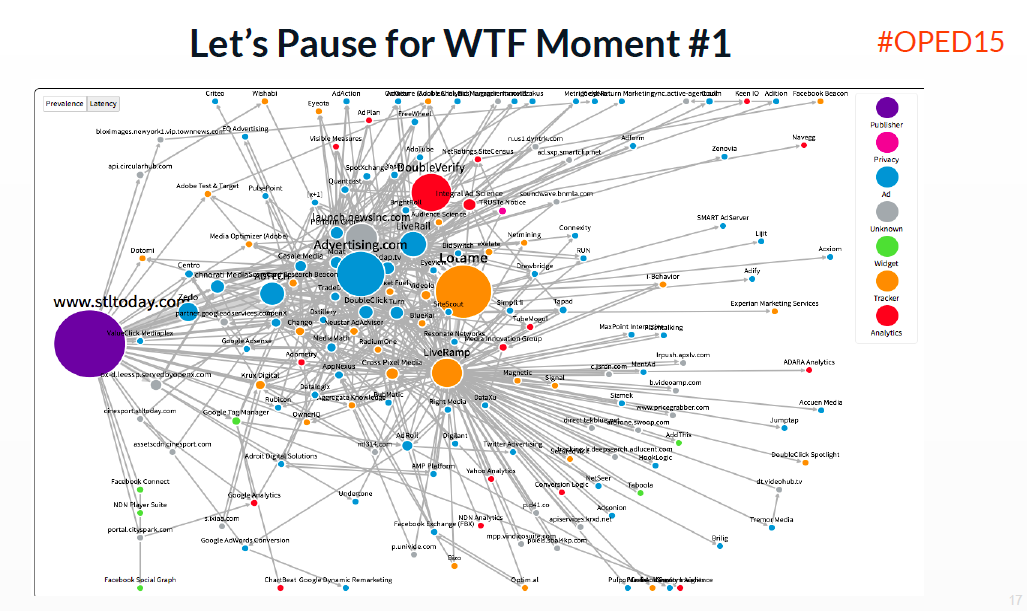Don Marti
Mon 02 Mar 2015 07:39:32 PM PST
Digital dimes in St. Louis
From Jason Kint at Digital Content Next, here's all the third-party web tracking that comes with browsing the St. Louis Post-Dispatch web site.
Read the whole thing. (via Darren Herman, on Twitter)
So, not much of a surprise, people don't trust web ads, because creepy tracking. Kint writes,
This problem is only getting worse and the consumer tools that counter it are getting less effective and more and more damaging to those who respect the consumer’s right to understand when and why their activities are being tracked. Transparency and providing the consumer with adequate control over their online privacy are vital—not harmful—to businesses that are built on a solid foundation of trust.
But he's only got part of the solution. Transparency is unworkable. How can regular people read every privacy policy for the third-party trackers they run into, when nobody at the St. Louis Post-Dispatch seems to be able to read the privacy policies for the trackers the paper uses on its own site? Here's what the Post-Dispatch site has to say about their third-party ads:
These companies may employ cookies and clear GIFs to measure advertising effectiveness. Any information that these third parties collect via cookies and clear GIFs is generally not personally identifiable.... We encourage you to read these businesses' privacy policies if you should have any concerns about how they will care for your personal information.
In other words, "third party tracking? That's
a thing on the Internet now. We have no idea what's
going on with it, so you're on your own." No wonder,
as Kint points out, Online advertising is trusted
less than any other form of advertising.
The result of all this tracking isn't just wigged-out users and ever-increasing ad blocker installs. The real problem for newspaper sites is data leakage. All those trackers that Kint points out are busily digesting the paper's audience like flies on potato salad, breaking the readership down into database records, and feeding the "print dollars to digital dimes" problem by breaking signaling.
When it comes to data leakage, publishers
aren't bringing a knife to a gun fight, they're
bringing a white paper about a knife to a gun
fight. Terry Heaton, in “Local” is Losing to
Outsiders:
In 2015, [non-local] independent companies will
account for nearly three-fourths of all digital
advertising, elbowing out local-media competitors who
have tried for two decades to use their existing sales
forces to also sell digital advertising.
Why is
it that when a St. Louis business wants to advertise
to a St. Louis newspaper reader, three-quarters of
the money goes to intermediaries in New York and Palo
Alto?
The problem, though, isn't so much that the adtech firms are taking 3/4 of the advertising pie, it's that they're making the pie smaller than it could be, by building the least trustworthy form of advertising since email spam.
So how do we keep the local papers, the people who are doing the hard nation-protecting work of Journalism, going? Kint says the "consumer tools" are getting worse, and if you're just looking at the best-known ad blocker, I'd have to agree. The "acceptable ads" racket doesn't address the tracking problems that matter. Meanwhile, it's not practical to browse the web with no protection at all, because who's going to read all those "transparent" explanations of exactly how some company you've never heard of sells some information you didn't know you were revealing?
Fortunately, though, we have publisher-friendly alternatives to ad blocking such as Tracking Protection on Firefox, the Disconnect extension, and Microsoft's Tracking Protection Lists. Instead of focusing on the two bad alternatives: unaccountable tracking or misdirected ad blocking, why not focus on the tracking protection that works?
Don't worry, interesting stuff remains to be done. To start with, hey, where are all the ads on stltoday.com? Just because I want to get protected from creepy tracking doesn't mean I'm against advertising in general. I like to look at the ads in local papers when I'm going there, because it gives me a sense of business in the town. (The New York Times is showing me Saks Fifth Avenue ads, and I have tracking protection on.) St. Louis, please, make your newspaper site work with tracking protection, and show me some ads.
